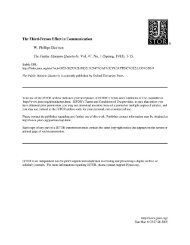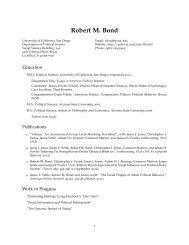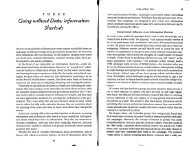Chapter 6 Why Authoritarian Parties? The Regime Party as an ...
Chapter 6 Why Authoritarian Parties? The Regime Party as an ...
Chapter 6 Why Authoritarian Parties? The Regime Party as an ...
You also want an ePaper? Increase the reach of your titles
YUMPU automatically turns print PDFs into web optimized ePapers that Google loves.
CHAPTER 6<br />
service <strong>an</strong>d benefits within authoritari<strong>an</strong> parties. <strong>The</strong> <strong>as</strong>sumption of only two party r<strong>an</strong>ks is<br />
probably the starkest departure from real-world partis<strong>an</strong> hierarchies. This is a simplification<br />
whose sole purpose is to facilitate our examination of the incentives that emerge within<br />
party hierarchies by keeping our <strong>an</strong>alysis tractable. This <strong>as</strong>sumption c<strong>an</strong> be e<strong>as</strong>ily relaxed:<br />
we c<strong>an</strong> view the present setting <strong>as</strong> a partial model of career incentives across <strong>an</strong>y two levels<br />
of a multi-level party hierarchy. For inst<strong>an</strong>ce, our partial <strong>an</strong>alysis implies that, in order to<br />
provide sufficient incentives for party membership <strong>an</strong>d costly service by the junior r<strong>an</strong>ks,<br />
the ch<strong>an</strong>ces of promotion only have to be positive, not necessarily certain. When applied to<br />
<strong>an</strong>y two levels of the party hierarchy, this result explains the pyramid-shaped structure of<br />
party apparatusesthat we typically observe inauthoritari<strong>an</strong>parties. 19 Similarly, we saw that<br />
after a junior party member provides costly service, she acquires <strong>an</strong> interest in the regime’s<br />
perpetuation. When applied across <strong>an</strong>y two levels of the party hierarchy, this insight implies<br />
that a stake in the regime’s survival compounds with a member’s r<strong>an</strong>k in the party hierarchy.<br />
6.1.2 Political Control over Appointments<br />
M<strong>an</strong>y single-party dictatorships appear to have <strong>as</strong>pired after total political <strong>an</strong>d social control<br />
of their societies. As articulated by Benito Mussolini’s (1935, 30) “everything in the State,<br />
nothing outside the State, nothing against the State” (Mussolini 1935, 30), the presumed<br />
political ambition of these regimes w<strong>as</strong> a complete fusion of the state, the party, <strong>an</strong>d the<br />
society. Cl<strong>as</strong>sic works on totalitari<strong>an</strong>ism have attributed this tendency to the social atomiza-<br />
tion of modern m<strong>as</strong>s societies (Arendt 1951, 308-17) <strong>an</strong>d the emergence of all-encomp<strong>as</strong>sing<br />
ideologies whose ultimate goal w<strong>as</strong> to tr<strong>an</strong>sform the hum<strong>an</strong> nature (Friedrich <strong>an</strong>d Brzezin-<br />
19 See e.g. Brownlee (2007, <strong>Chapter</strong> 2), Hinnebusch (2002, <strong>Chapter</strong> 4), L<strong>an</strong>dry (2008), <strong>an</strong>d Staar (1988).<br />
27











